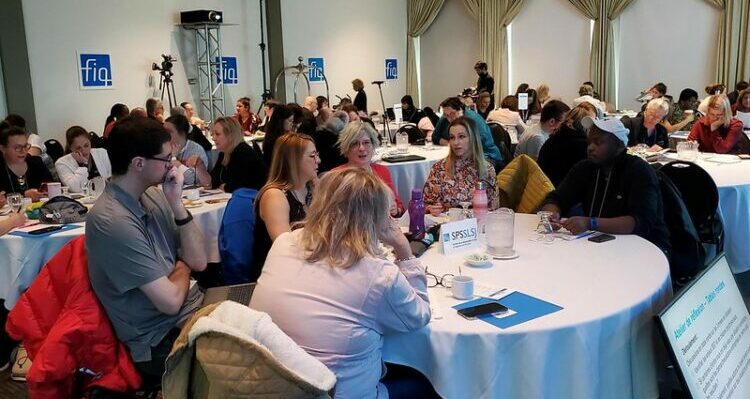
Psychosocial risks: from awareness-raising to action!
On April 26 and 27, about 120 union reps participated in the new edition of the Occupational Health and Safety Network with the slogan “Psychosocial risks: from awareness-raising to action!”
Psychosocial risks in the workplace rank among those that affect healthcare professionals the most. Work overload, low recognition, mandatory overtime, violence and subjection to employer whims are unfortunately things they have to deal with on a daily basis. For healthcare professionals, preventing these risks is a priority.
That is why the union reps gathered together—to be informed and equipped to use the best ways of identifying these psychosocial risks and to define the best ways to handle them. The goal was to find ways to go from theory to union action in prevention and better support members.
A first workshop helped union reps to identify the various psychosocial risks healthcare professionals experience, to recognize their scope, and to take stock of the impacts they can have. Teams shared their experiences, which really enriched our union interventions, helping us to avoid pitfalls others have encountered and to adopt the most promising strategies.
Then, Mélanie Lefrançois, a professor of occupational health and safety at UQAM, gave a talk on how mandatory overtime affects the health and safety of healthcare professionals. The evidence is clear: mandatory overtime is not the only thing that poses significant risks for our members—there’s also voluntary overtime, work overload, poor schedule management and the intensification of the work.
Next, there was a conversation with Audrey Marineau, a nurse and member of the Syndicat des professionnelles en soins de Montérégie-Est. She shared her personal experience and that of her colleagues who are repeatedly subject to mandatory overtime and whose employer has used tactics to make them feel guilty and to try to divide them. It was clear from these discussions that the solution to employer manipulation is solidarity among healthcare professionals.
To conclude the first day, Nathalie Jauvin and Lise Poisblaud, from the Institut national de santé publique du Québec (INSPQ), presented the main psychosocial risks, the tools the INSPQ developed to identify and prevent them, as well as several other useful resources for union reps and their members.
The next day was devoted to violence prevention. Josianne Brouillard, from the Association paritaire pour la santé et la sécurité du travail du secteur affaires sociales (ASSTSAS), talked to the participants about the prevention of psychological harassment and incivility at work. The presentation showed union reps that in addition to violence from patients, violence between employees is also an OHS issue.
Lastly, domestic violence prevention in the workplace was also discussed. Thanks to Catherine Boucher from the initiative Milieux de travail alliés contre la violence conjugale, the union reps are now better equipped to notice signs that a worker is possibly a victim of domestic violence. Support mechanisms for victims were also discussed. As a labour organization made up primarily of women, domestic violence prevention is an extremely important issue!
